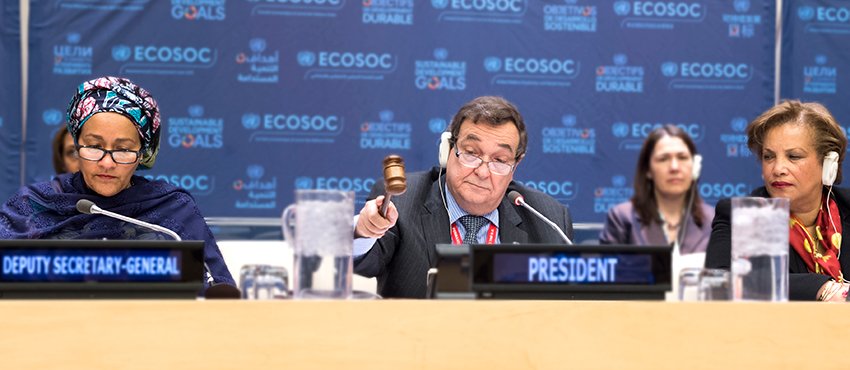
The 2017 ECOSOC operational activities for development segment took place from 28 February - 2 March 2017 at UN Headquarters in New York. The segment looked at key elements of the 2016 Resolution on the Quadrennial Comprehensive Policy Review around the re-positioning of the UN development system in the context of the 2030 Agenda for Sustainable Development.
For more information on the 2017 segment, please see below.
- Substantive documentation
- 2017 Report of the Secretary-General on QCPR: Funding analysis
- Technical note on definitions, sources and coverage (forthcoming)
- Statistical annex on funding data
- 2016 General Assembly resolution on the QCPR (A/RES/71/243)
- 2016 Report of the Secretary-General: Recommendations
- Summary of ECOSOC Dialogue: Phase 1
- Summary of ECOSOC Dialogue: Phase 2
- The Future We Want, the UN System We Need: Papers by the Independent Team of Advisors to the ECOSOC Bureau
- 2017 Report of the Secretary-General on QCPR: Funding analysis
- Programme
- Side events flyers
- Biographies
- Summary / Key messages emanating from deliberations
- Statements and Presentations (updated as available)
- DAY 1, 28 February 2017
Opening
Building a stronger UN development system for delivering on the 2030 Agenda
- H.E. Mr. Marcos Barraza, Minister of Social Development, Chile
- Ms. Sisomboun Ounavong, Director‐General, Ministry of Planning and Investment, Lao PDR
Remarks by Member States during the interactive dialogue
Dialogue with Executive Heads of UN Funds, Programmes and Specialized Agencies
- Mr. Yannick Glemarec, Deputy Executive Director, UN Women
- Ms. Helen Clark, Administrator, UNDP
- Mr. Anthony Lake, Executive Director, UNICEF
- Mr. Babatunde Osotimehin, Executive Director, UNFPA
- Mr. Amir Abdulla, Deputy Executive Director, WFP
- Mr. Greg Vines, Deputy Director‐General, ILO
Remarks by Member States during the interactive dialogue
- DAY 2, 1 March 2017
Key messages of the Secretary-General’s 2017 report on funding of operational activities of the UN system
Rethinking the funding and financing strategies of the UN development system to deliver on the 2030 Agenda
- Mr. Admasu Feyisa, Director a.i., UN Agencies and Regional Economic Cooperation Directorate, Ministry of Finance and Economic Development, Ethiopia
- Mr. Daovy Vongxay, Deputy Director‐General, Ministry of Foreign Affairs, Lao PDR
- Mr. Gaudenz Silberschmidt, Director a.i., Coordinated Resource Mobilization, WHO
- Mr. Björn Gillsäter, Manager, World Bank Group
Remarks by Member States during the interactive dialogue
Improving the governance and coordination of the UN development system
- H.E. Mr. H.E. Mr. Walton Alfonso Webson, Permanent Representative to the United Nations, Antigua and Barbuda, President, UNICEF Executive Board
- H.E. Ms. Lana Zaki Nusseibeh, Permanent Representative of the United Arab Emirates to the United Nations, President, UN‐Women Executive Board
- Ms. Alicia Barcena, Executive Secretary, United Nations Economic Commission for Latin American and the Caribbean
- Ms. Helen Clark, UNDG Chair
Remarks by Member States during the interactive dialogue
Moving the QCPR forward at field level: Creating a common back office to function as a system
- Mr. Jeremiah Kramer, Inspector and Chair, UN Joint Inspection Unit
- Ms. Jan Beagle, Vice‐Chair, High‐level Committee on Management (HLCM), Deputy Executive Director, UNAIDS
- Mr. Sanaka Samarasinha, UN Resident Coordinator and UNDP Resident Representative, Belarus
Remarks by Member States during the interactive dialogue
- DAY 3, 2 March 2017
From coordinated to integrated implementation of the 2030 Agenda: the development, humanitarian and peacebuilding nexus
- H.E. Mr. Peter Thomson, President of the General Assembly
- Ms. Mbaranga Gasarabwe, Deputy Special Representative of the Secretary-General in MINUSMA, UN Resident Coordinator, UN Humanitarian Coordinator and UNDP Resident Representative, Mali
- H.E. Mr. Nawaf Salam, Permanent Representative of Lebanon to the United Nations
- Ms. Berit Fladby, Policy Director, UN Operational Activities, Department for UN and Humanitarian Affairs, Ministry of Foreign Affairs, Norway
Remarks by Member States during the interactive dialogue
Integrated implementation of the 2030 Agenda: the role of the UNDS in LDCs, LLDCs, SIDSs and countries emerging from conflict
- H.E. Mr. Muhammad Abdul Mannan, State Minister, Ministry of Planning, Bangladesh
- Ms. Amina Shaaban, Deputy Permanent Secretary, Ministry of Finance and Planning, Tanzania
- Mr. Raul Martinez Villalba, Director, International Organizations, Ministry of External Relations, Paraguay
Remarks by Member States during the interactive dialogue
Integrated implementation of the 2030 Agenda: the role of the UNDS in addressing the needs and diverse challenges of Middle Income Countries
- H.E. Mr. Andrei Dapkiunas, Permanent Representative of Belarus to the United Nations
- Mr. Rene Mauricio Valdes, UN Resident Coordinator and UNDP Resident Representative, Argentina
Remarks by Member States during the interactive dialogue
Closing
GENERAL DEBATE (DAY 2)
- Bangladesh on behalf of the LDCs
- Ecuador on behalf of G77 and China
- Malta on behalf of the European Union
- Maldives on behalf of AOSIS
- El Salvador on behalf of the Community of Latin American and Caribbean States
- Trinidad and Tobago on behalf of CARICOM
- Nauru on behalf of the Pacific Small Island Development States
- Honduras on behalf of Like-Minded Group of Countries Supporters of Middle Income Countries
- Australia on behalf of Canada and New Zealand
- Brazil
- Burkina Faso
- Czech Republic
- Chile
- Lebanon
- Norway
- Saint Vincent and the Grenadines
- South Africa
- Peru
- Vietnam
- United States of America
GENERAL DEBATE (DAY 3)
- Cuba
- Republic of Moldova
- Tajikistan
- Republic of Korea
- Philippines
- Estonia
- Egypt
- Guatemala
- Netherlands
- India
- Russian Federation
- Honduras on behalf of Like-Minded Group of Countries Supporters of Middle Income Countries
- Thailand
- Venezuela
- Afghanistan
- Panama
- Switzerland
- Mexico
- Indonesia
- Myanmar
- Bosnia and Herzegovina
- Azerbaijan
- Algeria
- FAO
 مرحباً بكم في الأمم المتحدة
مرحباً بكم في الأمم المتحدة